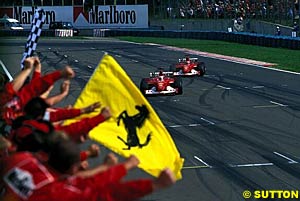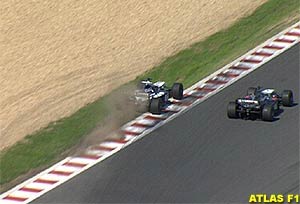
Atlas F1 Magazine Writer
What happened at last year's Hungarian Grand Prix? How is Juan Pablo Montoya expected to perform next weekend? And how bad is Michael Schumacher's situation right now? Marcel Schot brings the answers and more anecdotes on the thirteenth round of 2003
However, as of Friday the team didn't leave any room for misinterpretation. They were going for the title and they wanted it right now. Even when Rubens Barrichello's lead over the Williams pair was just three tenths, Michael Schumacher slammed the competition with a psycological sledgehammer. The German was nearly a full second faster than the first non-Ferrari, his brother Ralf in the Williams.
If the first session was a sledgehammer, the session on Saturday morning was nothing less than a wrecking ball. As Barrichello caught up with his teammate, the pair were nearly 1.5 seconds ahead of the competition. Add to that the relatively weak performance of the Williams pair, who finished fourth and eight respectively, and the Constructors' Championship was almost decided before the race had even started.
During the afternoon's qualifying session Ralf Schumacher pulled everything out of the bag, but the Williams driver was stranded four tenths behind the Ferrari pair. Rubens Barrichello's Pole Position was the fastest lap ever around the circuit, seven tenths quicker than Schumacher's Pole from 2001.
On race day nothing changed. From the start the boys in red drove away and only Ralf Schumacher could follow at a distance. In the first 13 laps both Ferrari drivers stayed close and opened up a gap of 11 seconds towards the first Williams with the rest of the field following at already about twenty seconds behind. Shortly before the first pitstops it became clear that Barrichello and his teammate had been holding back as they quickly increased the gap towards Ralf Schumacher to 17 seconds without the Williams driver being able to respond.
The odd thing about this race is that it probably looks more interesting on paper than it really was. The only thing that really was interesting to watch was the duel between young guns Juan Pablo Montoya and Kimi Raikkonen. For the first 21 laps of the race their laptimes were nearly identical with a struggling Montoya staying ahead of the Finn with hand and feet, reminiscing of Gilles Villeneuve's epic battle against faster cars in the 1981 Spanish Grand Prix.
However, were Villeneuve withstood the pressure to win a glorious victory, Montoya succumbed to Raikkonen's pressure. Into the 22nd lap, the McLaren driver made a brave move around the outside in the second corner. Montoya didn't give in and that's what cost him dearly. The next corner was to the right and thus gave Raikkonen the inside line. As Montoya even then refused to give up his seventh place, his only choice to avoid a collision was to steer off the track, damaging his bodywork.
Even though the smaller teams have often performed well in Hungary - where good drivers in bad cars could compensate for the lack of horsepower with their driving skills - the victory was nearly always the prey of a Champion. Rubens Barrichello last year and Thierry Boutsen in 1990 were the only winners of the Hungarian Grand Prix who have never won a World Championship. However, in only seven out of 17 cases the winner of the Hungarian Grand Prix won the World Championship in that year. Only three have won the Hungarian Grand Prix one or more years before they became World Champion: Nigel Mansell in 1989, Damon Hill in 1993 and Jacques Villeneuve in 1996.
While all was decided after the Hungarian Grand Prix last year, it's a very different situation this year. Due to the new points system there are still seven drivers who have a mathematical chance of winning the drivers' title, with three drivers of three different teams being serious contenders. The Constructors' Championship is also still wide open. Ferrari and Williams are just two points apart and even McLaren in third are just 17 points out of the lead.
For one of the Championship candidates, Juan Pablo Montoya, this coming race is not a favourite venue. In his previous outings at Hungary, the Colombian has never been very lucky, but after having scored a dominant win in Germany his spirits must be high. Combined with the positive effect the potentially hot weather gives the Michelin tyres, this could help Montoya defeat his Hungarian demons.
Despite a dramatic race in his home Grand Prix three weeks ago, Michael Schumacher is still the man to beat. Although his dominance has vastly lessened this year, the statistics show a different picture. The German has finished in the points for nine successive races, with this year's Brazilian Grand Prix being the only race in the last 34 where he didn't score. Looking even further back, there's only three in his last 52 races where the five times World Champion didn't score points. From the 2000 Hungarian Grand Prix until now, he has scored 28 wins and 43 podium finishes. However, with the last four races ending fifth, third, fourth and seventh, it's about time the World Championship leader shows he's worth the illusive sixth title.
After a small summer break, the Formula One circus returns to action at the Hungaroring, just outside Budapest. It's the third consecutive season where the Hungarian Grand Prix takes place after a three-week break, and in the previous two editions this proved to be advantageous to Ferrari. The Maranello team scored a one-two victory on both occasions, with Michael Schumacher taking the win in 2001 and Rubens Barrichello being victorious last season.
 Even though it was only the 13th race of the season, last year's Hungarian Grand Prix was the last race where Ferrari had something to fight for. Michael Schumacher was already World Champion - having clinched the title with five races to go - and the team's lead in the Constructors' Championship was 65 points. With still a maximum of 80 points up for grabs for one team, Ferrari's chances of winning the title in Hungary were relatively small. Everything less than a win would leave them dependant of the results of the Williams drivers.
Even though it was only the 13th race of the season, last year's Hungarian Grand Prix was the last race where Ferrari had something to fight for. Michael Schumacher was already World Champion - having clinched the title with five races to go - and the team's lead in the Constructors' Championship was 65 points. With still a maximum of 80 points up for grabs for one team, Ferrari's chances of winning the title in Hungary were relatively small. Everything less than a win would leave them dependant of the results of the Williams drivers.
 As Ralf was the last of the three to stop, he gained the lead for a single lap, but when all three of them were back on track the younger Schumacher was one and a half second further behind than he had been before. Once again the Ferraris were faster in the first few laps after the stop, increasing their lead to 24 seconds, after which they merely cruised to the end of the race. For a short period flashbacks of their Austria antics appeared as Schumacher closed his gap towards Barrichello from 3.5 seconds to a few tenths in the space of a few laps, but in the end both Ferrari drivers eased off, allowing Ralf Schumacher to finish only 13 seconds behind them.
As Ralf was the last of the three to stop, he gained the lead for a single lap, but when all three of them were back on track the younger Schumacher was one and a half second further behind than he had been before. Once again the Ferraris were faster in the first few laps after the stop, increasing their lead to 24 seconds, after which they merely cruised to the end of the race. For a short period flashbacks of their Austria antics appeared as Schumacher closed his gap towards Barrichello from 3.5 seconds to a few tenths in the space of a few laps, but in the end both Ferrari drivers eased off, allowing Ralf Schumacher to finish only 13 seconds behind them.
|
Volume 9, Issue 34
Atlas F1 Special
Special Project: How to Save F3000
Atlas F1 Exclusive
Giancarlo Fisichella: Through the Visor
Articles
Remembered Down on the Farm
Season in the Sun
2003 Hungarian GP Preview
2003 Hungarian GP Preview
Hungary Facts & Stats
Columns
The Fuel Stop
The F1 Trivia Quiz
On the Road
Elsewhere in Racing
The Weekly Grapevine
> Homepage |